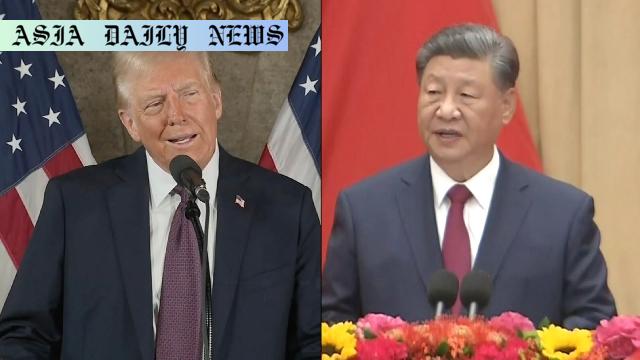US President Trump requests China’s Xi Jinping to mediate in the Ukraine-Russia conflict, stressing NATO’s defense spending hike.
US President Trump asks Chinese leader Xi Jinping for help in resolving Ukraine’s war.
Trump suggests NATO allies increase defense spending to 5% of GDP.
Trump hints at imposing additional sanctions on Russia if no progress is made.
China’s role in the geopolitical resolution remains limited as of now.

Trump Seeks Xi’s Help to Resolve Ukraine Conflict
During a media briefing, US President Donald Trump revealed that he had urged Chinese President Xi Jinping to mediate in the ongoing Ukraine-Russia conflict. The move highlights Trump’s apparent strategy of leveraging global powers to pressure Russia and facilitate a resolution. When asked by a reporter if the topic of Ukraine was discussed between the two, Trump confirmed, saying, “Yeah. I said, you ought to get it settled.” While praising Xi’s considerable influence, he also mentioned that China had done little so far to address the crisis.
Focus on Accelerating Ceasefire Negotiations
Trump underscored the importance of early ceasefire negotiations to end the devastating war in Ukraine, which continues to claim lives and disrupt global geopolitics. He hinted at the possibility of imposing additional sanctions on Russia if President Vladimir Putin refused diplomatic talks. This statement points to Trump’s willingness to escalate economic measures to pressurize Moscow into discussions.
NATO’s Role and U.S. Stance
The US president also touched upon the broader international implications of the crisis, noting a significant effect on European nations in comparison to the United States. Reiterating his stance on defense spending, Trump criticized NATO nations for not meeting financial commitments. He recommended a sharp increase in their defense budget targets from 2% to 5% of GDP, urging European allies to shoulder a greater share of the defense burden amidst rising global tensions.
China’s Strategic Position
Although Trump commended Xi Jinping’s authority and influential role on the global stage, China’s involvement in resolving the Ukraine situation has been minimal so far. Xi maintains close diplomatic and strategic ties with Russian President Vladimir Putin, which complicates its role as a mediator. Observers note that while China could influence Russia, its direct intervention may undermine its geopolitical strategy of maintaining neutrality.
Significance of U.S. Leadership
The US president’s engagement with global leaders, particularly Xi Jinping, represents an evolving approach of involving key international players to curb the Ukraine crisis. By highlighting China’s potential to influence Russia and by placing additional pressure on NATO allies, Trump demonstrates a strategic focus on multilateral efforts to achieve peace in Ukraine. This move could be seen as part of broader attempts to stabilize global order amidst escalating conflicts.
Ongoing Questions and Geopolitical Implications
The outcome of these diplomatic efforts remains uncertain. Whether China would heed calls to mediate and navigate its dual stance between Russia and the West is a significant question. Additionally, the effectiveness of increased sanctions and NATO budget adjustments in influencing the course of the conflict remains to be evaluated. Ultimately, the future of the Ukraine war hinges on coordinated international action and willingness for compromise among involved parties.
Commentary
Greater Collaboration Needed for Global Stability
President Trump’s call for China to take on a more active role in resolving the Ukraine crisis brings to light the intricate dynamics of global diplomacy. Expecting nations like China to play mediatory roles often demands balancing geopolitical interests, alliances, and economic stakes. While China has leverage over Moscow due to its strong ties with Putin, its propensity to act decisively in favor of de-escalation remains uncertain.
NATO’s Responsibility in the Crisis
The suggestion to increase NATO defense spending highlights long-standing debates about European nations contributing adequately to collective security. Raising the benchmark to 5% of GDP could strengthen NATO’s initiatives but might also strain member nations’ budgets. NATO’s unified stance and commitment are pivotal in supporting Ukraine and deterring further aggression by Russia.
China’s Potential Role: Deal-Maker or Neutral Observer?
China’s reticence could be interpreted as a calculated strategy to maintain its position on the global stage without antagonizing Russia or the West. If Beijing were to mediate, it could mark a pivotal shift in its global strategy and potentially bring vital momentum to peace efforts. However, such interventions must be handled delicately to avoid damaging long-standing alliances or triggering further geopolitical unrest.
Final Thoughts
Ultimately, the resolution of the Ukraine crisis requires collective and balanced action from global powers. President Trump’s efforts to involve China signal a broader recognition of interconnected global responsibilities. Whether these efforts will bear fruit depends on the willingness of all parties, including Russia, to subscribe to diplomacy and work toward lasting peace.


